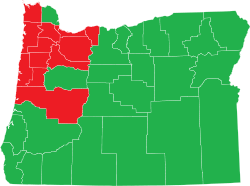- Oregon Ballot Measure 63 (2008)
-
Measure 63 Exempts specified property owners from building permit requirements for improvements valued at/under 35,000 dollars. Election results Yes or no Votes Percentage  No
No928,721 54.21% Yes 784,376 45.79% Invalid or blank votes % Total votes 1,713,097 100.00% Voter turnout 85.7% Election results by county YesNoSource: Oregon Secretary of State [1]
Oregon Ballot Measure 63 (IRR 21) was an initiated state statute that appeared on the November 4, 2008 general election ballot in Oregon. It would have allowed homeowners to make improvements costing less than $35,000 to their home/real estate without first obtaining a building permit.Contents
Background
On May 5, 2008, the Oregon Secretary of State announced that the measure had sufficient signatures to qualify for the November ballot. 82,769 valid signatures were required, and the initiative's supporters had turned in 83,869 valid signatures, or 65.65% of the 127,755 total signatures that were submitted. During the campaign to collect signatures, the pro-initiative committee paid Democracy Direct, a petition drive management company, a little under $40,000 to collect signatures for the measure.[2]
Specific provisions
If the measure had passed, the following provisions would have been enacted:
- The exemption would apply for changes to existing residential or farm structures and for building new farm structures that will not be lived in by people.
- Changes would not be exempt if the total value of changes in a year to a given structure exceeded $35,000.
- The addition of a story to an existing residential structure would not be exempt from building, plumbing, electrical and mechanical permit requirements.
- Measure 63 would not allow an addition that violates uniformly applied requirements for property line setbacks or that violates regulations establishing reasonable, uniformly applied limitations on the height of a building.
- Electrical wiring work would not be exempt unless performed or inspected by a licensed electrical contractor.
- A property owner could not accept an offer-to-purchase the property without giving the purchaser a detailed description of changes made to the property.[3]
Estimated fiscal impact
The state's Financial Estimate Committee prepares estimated fiscal impact statements for any ballot measures that will appear on the ballot. The estimate prepared by this committee for Measure 62 says:
- Measure 63 will reduce local government revenue by between $4-$8 million each year.
- It will reduce state government revenues by between $450,000-$750,000 each year.[4]
Supporters
The measure's chief petitioners were Alan Grosso and Bill Sizemore. The name of the officially-filed committee supporting the initiative was the "Fairness in Home Improvement PAC".
Arguments in favor of Measure 63
Notable arguments made in favor of Measure 63 included:
- Measure 63 would eliminate some of the bureaucratic interference involved with small property improvements by exempting specified property owners from building permit requirements for improvements valued at or under $35,000.
- Bill Sizemore says, "To me, it's so highly symbolic that in a country that claims to be as free as ours, you can't go out and nail some boards to the side of your house without the government's permission."[5]
Donors in favor of Measure 63
Funds for signature collection for the proposal were donated by a group called Hire Calling Public Affairs, which was affiliated with Richard Wendt, founder of Jeld-Wen, a Klamath Falls manufacturing company.[6]
Opponents
Defend Oregon was opposed to Measure 63, as was a group called Oregonians Against Unsafe Housing.
Arguments against Measure 63
Notable arguments made against Measure 63 included:
- "Because building permits are often the primary enforcement mechanism for maintaining standards, making permits unnecessary seems like a sneak attack on the law. In fact, Measure 21 appears to be another instance of a bad neighbor law: one that puts communities on the defensive against individuals who might like to elide the rules."[7]
- "Oregonians want to sleep safely at night knowing that work on their foundation, walls, roofs, electrical and plumbing was done to code. If this measure passes, that peace of mind will go out the window."[8]
- The measure will put renters, home buyers, neighbors, and emergency responders at risk due to the extensive, shoddy construction work that can be done for $35,000 (or $70,000 over two calendar years).
Donors opposing Measure 63
Defend Oregon, as a committee, fought seven different ballot measures, and supported two others. As a result, it is not possible to discern how much of its campaign money was going specifically to defeat Measure 59. Altogether, the group raised over $6 million in 2008.[9]
Major donations to the Defend Oregon group as of October 8 included:[10]
- $4.1 million from the Oregon Education Association.[11],[12]
- $100,000 from School Employees Exercising Democracy (SEED)[13]
- $100,000 from the AFL-CIO.
- $50,000 from Oregon AFSCME Council 75.
Newspaper endorsements
Here is how Oregon's major newspapers endorsed on the measure.
Newspapers Yes No The Oregonian No Medford Mail-Tribune No Statesman Journal No Bend Bulletin No Eugene Register-Guard No Daily Astorian No East Oregonian No Corvallis Gazette Times No Coos Bay The World No Willamette Week No Yamhill Valley News Register No Gresham Outlook No Notes
- ^ Bradbury, Bill (4 November 2008). "Official Results – November 4, 2008 General Election" (Website). Elections Division. Oregon Secretary of State. http://www.sos.state.or.us/elections/nov42008/g08results.html. Retrieved December 24, 2008.
- ^ Unofficial initiative signature verification results for Measure 21
- ^ Detailed explanation of Measure 63
- ^ Estimated fiscal impact statement for Oregon Measure 62
- ^ The Oregonian, "Oregon Measure 63 could loosen home fix-it permits", October 5, 2008
- ^ The Oregonian, "Nevada activist bets on Oregon voters", August 2, 2008
- ^ Daily.Sightline.org: "Measure 21", Sightline Daily, Daily Score Blog
- ^ From the "No on 63" website
- ^ Campaign finance history of Defend Oregon for 2008
- ^ Record of donations to Defend Oregon
- ^ Oregon Live, "Teachers, nurses add $2.5 million to campaigns", September 10, 2008
- ^ The Oregonian, "OEA puts $4 million into ballot measure fight", October 8, 2008
- ^ Oregonian, "School workers add $100,000 to campaign", August 25, 2008
External links
Basic information
- Oregon Voters' Pamphlet for Measure 63
- 2008 General Election Measures: Voter Guide
- Full text of the initiative
- Certified ballot title letter from the Oregon Attorney General
- Letters received from Oregon residents during the ballot title designation period
Supporters
Opponents
Topics in Oregon legislation Crime and sentencing Capital punishment · Measure 11 (1994) (mandatory minimum sentencing) · Measure 40 (1996) etc. (victims' rights) Abigail Scott Duniway was instrumental in establishing women's right to vote in Oregon.
Abigail Scott Duniway was instrumental in establishing women's right to vote in Oregon.
Elections and voting Gay rights Environment Land use Health care Minimum wage Taxation Tax revolt · Measure 5 (1990) (landmark tax law) · Measures 47 (1996) and 50 (1997) (adjusted Measure 5) · Kicker (tax rebate)Miscellaneous Influential people Background, further reading 2007 ← Oregon 2008 Elections → 2010 Categories:- Oregon 2008 ballot measures
Wikimedia Foundation. 2010.

